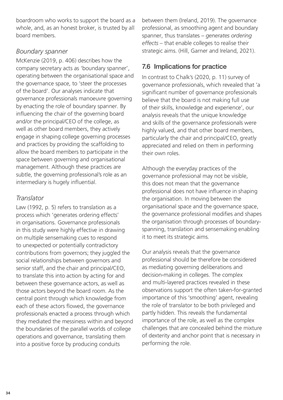
34
boardroom who works to support the board as a
whole, and, as an honest broker, is trusted by all
board members.
Boundary spanner
McKenzie (2019, p. 406) describes how the
company secretary acts as 'boundary spanner',
operating between the organisational space and
the governance space, to 'steer the processes
of the board'. Our analyses indicate that
governance professionals manoeuvre governing
by enacting the role of boundary spanner. By
influencing the chair of the governing board
and/or the principal/CEO of the college, as
well as other board members, they actively
engage in shaping college governing processes
and practices by providing the scaffolding to
allow the board members to participate in the
space between governing and organisational
management. Although these practices are
subtle, the governing professional's role as an
intermediary is hugely influential.
Translator
Law (1992, p. 5) refers to translation as a
process which 'generates ordering effects'
in organisations. Governance professionals
in this study were highly effective in drawing
on multiple sensemaking cues to respond
to unexpected or potentially contradictory
contributions from governors; they juggled the
social relationships between governors and
senior staff, and the chair and principal/CEO,
to translate this into action by acting for and
between these governance actors, as well as
those actors beyond the board room. As the
central point through which knowledge from
each of these actors flowed, the governance
professionals enacted a process through which
they mediated the messiness within and beyond
the boundaries of the parallel worlds of college
operations and governance, translating them
into a positive force by producing conduits
between them (Ireland, 2019). The governance
professional, as smoothing agent and boundary
spanner, thus translates - generates ordering
effects - that enable colleges to realise their
strategic aims. (Hill, Garner and Ireland, 2021).
7.6��Implications�for�practice
In contrast to Chalk's (2020, p. 11) survey of
governance professionals, which revealed that 'a
significant number of governance professionals
believe that the board is not making full use
of their skills, knowledge and experience', our
analysis reveals that the unique knowledge
and skills of the governance professionals were
highly valued, and that other board members,
particularly the chair and principal/CEO, greatly
appreciated and relied on them in performing
their own roles.
Although the everyday practices of the
governance professional may not be visible,
this does not mean that the governance
professional does not have influence in shaping
the organisation. In moving between the
organisational space and the governance space,
the governance professional modifies and shapes
the organisation through processes of boundaryspanning, translation and sensemaking enabling
it to meet its strategic aims.
Our analysis reveals that the governance
professional should be therefore be considered
as mediating governing deliberations and
decision-making in colleges. The complex
and multi-layered practices revealed in these
observations support the often taken-for-granted
importance of this 'smoothing' agent, revealing
the role of translator to be both privileged and
partly hidden. This reveals the fundamental
importance of the role, as well as the complex
challenges that are concealed behind the mixture
of dexterity and anchor point that is necessary in
performing the role.